Chinese New Year marks the beginning of spring and it is also to welcome the lunar-new year; the Chinese New Year celebration goes on for fifteen days.
On the fifteen day of Chinese New year, we call it ‘Chap Goh Meh’ in Hokkien (Fujian). “Chap Goh’ means fifteen, and ‘Meh’ means night. So ‘Chap Goh Meh’ means fifteenth night of Chinese New Year.
So what’s so special about the Chap Goh Meh?
It is the time to mark the end of an auspicious occasion with celebrations in full swing. If you read about Chap Goh Meh on the internet, and in many other places, it is about celebrating ‘Yuan Xiao Jie’, which is the lantern festival. However, for Penang, we only celebrate lantern festival during the mooncake festival and not on Chap Goh Meh.
However, these celebrations are still very much applauded in Penang with another huge round of family gatherings and visiting temple for prayers, AND it is also a day where love is in the air; we Penangites will refer to as The Valentine’s Day of East.
Also known as the Valentine’s Day of the East
I left home so long ago, therefore I am quite out of touch with what’s being celebrated in Penang right now. However, from memory, I remember we would drive round Penang streets together with our aunties and cousins to cross the seven bridges, enjoying the well-lit streets and temples, especially the famous Kek Lok Si temple. On this day, people will paying their respects to the God of Prosperity and ask for blessings of good fortune for their families.
On top of that, my grandmother used to share stories about the Dondang Sayang – mobile musicians, playing flutes, gongs, violins or other instruments, and the singers would be singing in verses or ‘pantun’. I am not sure whether it is still celebrated right now.
During those times, girls were mostly kept indoors and the young men could only get the chance to see them on Chap Goh Meh. The boys would only get to see the girls openly on the 14th, 15th and 16th of the Lunar New Year.
Therefore another highlight of the day would be the Chap Goh Meh procession. She and her unmarried sisters will have the chance to ‘see’ the opposite sex – three days of freedom cruising down the streets of Penang.
The girls would don their best dress and jewellery, sit in the car and cruise down the streets of Penang. It was something like a beauty pageant parade. This is the only time that the boys could see and potentially find their life partner during the process.
Later they would throw tangerines / mandarins in the sea or river in the belief that they will be able to marry good husbands. According to my cousin Gunn Kean Keat, ” Maidens would recite the mandarin orange bit before tossing them and the guys were supposed to recite the drum bit, though no one has actually practised that part”.
Source: Hokkien Rhymes and Ditties by Raymond Kwok
The mandarin throwing goes with the rhyme above – ‘Tim kum’, ‘Than ho ang’ – throw an orange/mandarin, you will get a good husband…….
I am very sure the mandarin / tangering tossing is still practised in Penang, however, with a twist.
If you would like to know more about how Chap Goh Meh was celebrated during the olden days, please read the article written by my grand-uncle Datuk Khor Cheang Kee – When love bloomed under the full moon – ‘Chinese Valentine’s Day’ during my grandparents’ time. I am sure you will enjoy the article, so download a pdf copy and enjoy the celebration of Chap Goh Meh – the bygone era.
Note: The bride and groom are my grandparents.
Source: Sunday Star 12th February 1995
Traditional Dish – Pungat or Pengat
The Pengat image is courtesy of my cousin from Penang Gunn Kean Keat.
Every special occasion has to be celebrated with a special dish and Chap Goh Meh is no different. This special day is celebrated with a well loved dessert known as Pungat or Pengat by Baba Nyonya families, or Babur Cha cha as commonly known. (Pengat is somewhat different from Babur Chacha)
Pungat is a very tasty, rich and sweet dessert made with sweetened coconut milk, accompanied with banana (pisang raja to be precise), sweet potatoes yellow, purple and orange – and taro. It is a very tasty and colourful dessert, and I am confident many people who have had the chance to enjoy the dessert will agree.
Source: Nyonya Heritage Kitchen by Ong Jin Teong
I love this book; each recipe accompanies amazing stories and the utentils used.
In this chapter, it explains the different types of bubur cha cha, how the Nyonya Pengat came about.
I hope you have some understanding about Chap Gor Meh and how it was and is celebrated in Penang. Do share your Chap Goh Meh stories with us.
References:
Hokkien Rhymes and Ditties by Raymond Kwok
by
Want to learn more about Baba Nyonya culture and Nyonya recipes?
Nyonya Susan Tan sends Chinese New Year greetings to all chin chia peng ewe through her Chinese New Year songs.
By State Chinese Penang Association
Source: https://www.youtube.com/watch?v=j-40bTbyatQ&feature=youtu.be
Dondang Sayang Chap Goh Meh: Moonlight & Romance

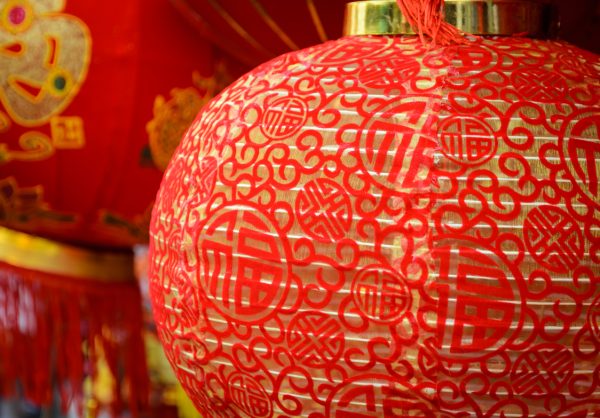
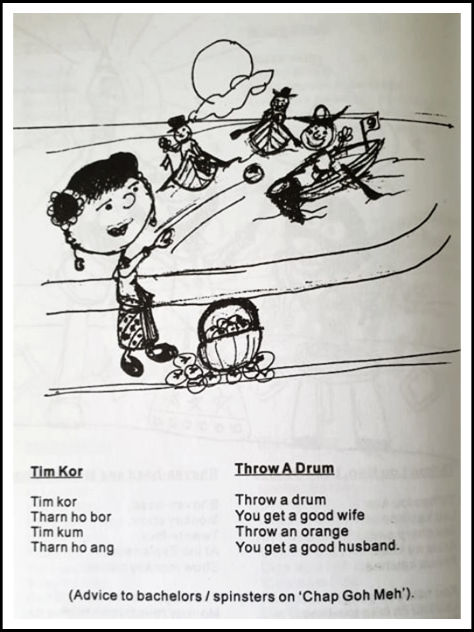
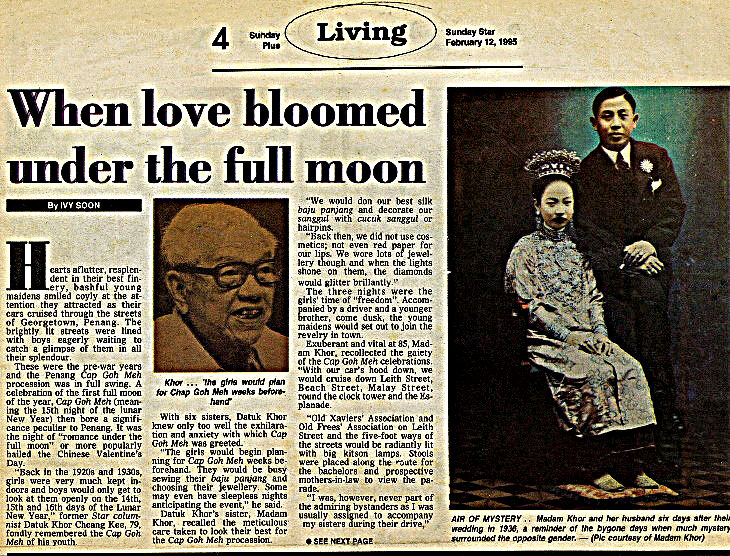
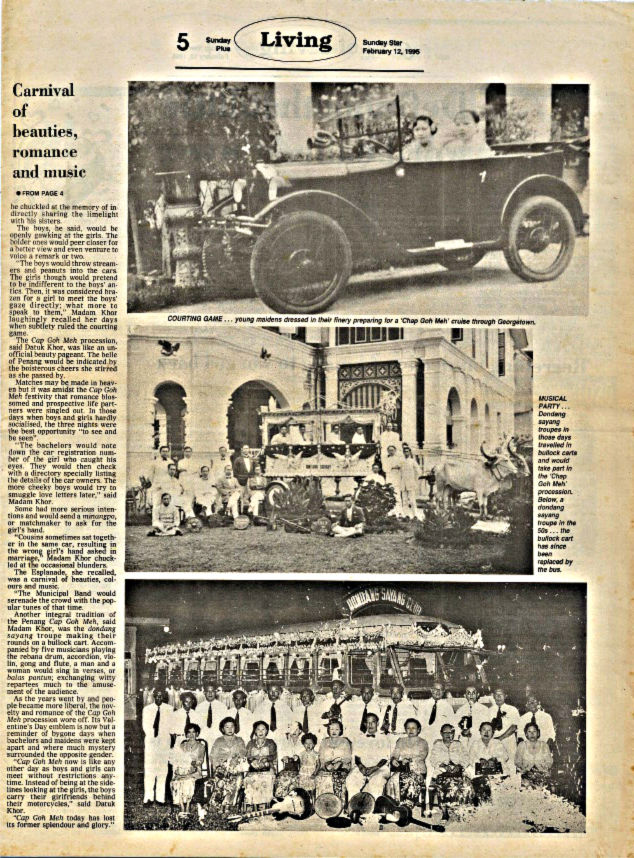
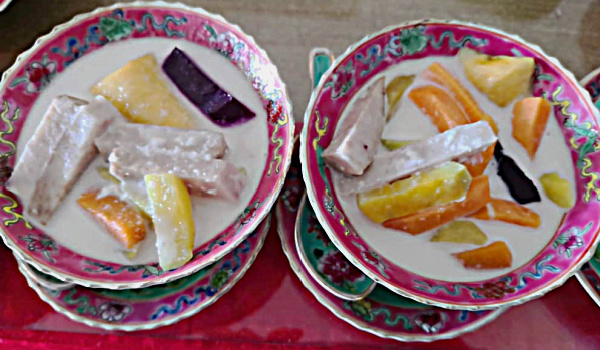
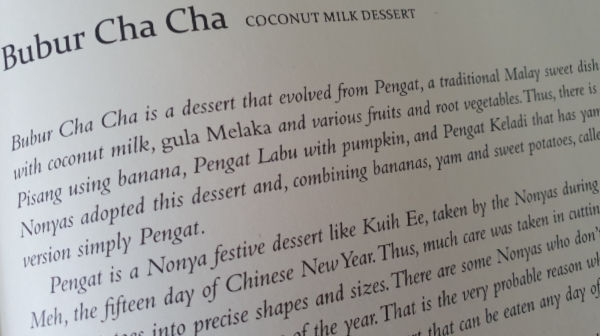
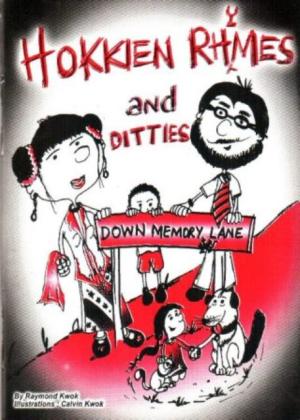



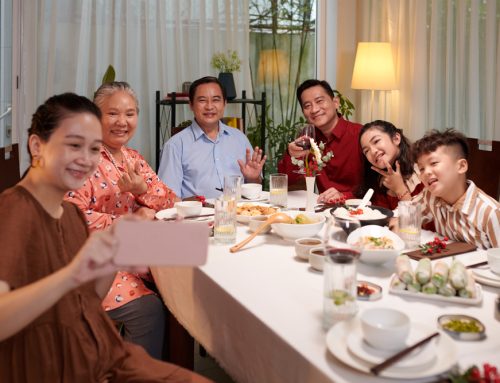
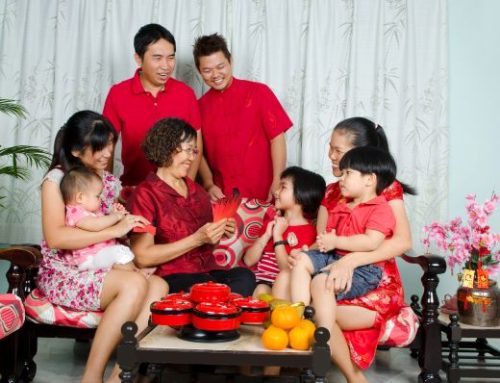



Leave A Comment